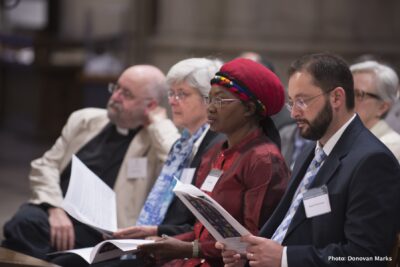Ecclesiological Investigations Unit
The Ecclesial Work of Unacknowledged Hands
Saturday, 9:00 AM – 11:00 AM
Cristina Lledo Gomez, BBI Australian Institute for Theological Education, Presiding
These papers discuss how many whose labor contributes to the life of the church often go unknown, unappreciated or underappreciated, and unacknowledged. They discuss the relations between centers and peripheries in the churches. The papers address blue-collar participation in the church, the history of HIV/AIDS in the work of an unacknowledged theologian, the work of church volunteers during Covid-19 lockdowns, and the work of mothers and “othermothers” in marginalized communities. They all address how the work of church building, so often assumed to be dependent upon the work of its leaders, is more often a creative bricolage that is the work of many hands, using many different means at hand.
Dylan Parker, Fuller Theological Seminary,
“Kevin Gordon’s Inevitable Agenda: Ecclesiology and AIDS”Katja Stoessel, University of Aberdeen
“Unacknowledged Ecclesial Work under Lockdown and the Risk of its Post-Pandemic Dismissal”
Katherine Douglass, Seattle Pacific University
“The Lived Public Theology of Mothers and Othermothers of Marginalized Youth”
A19-217
Ecclesiological Investigations Unit
Synodality: Possibilities and Pitfalls
Sunday, 12:30 PM – 2:30 PM
Britta Meiers Carlson, Boston University, Presiding
This roundtable session will be an ecumenical and interdisciplinary discussion of the place of synodality in ecclesiology today. The Roman Catholic Church’s current Synod on Synodality is one obvious indicator of the renaissance of synodality in that church under the leadership of Pope Francis. But synodality is not a new reality – Orthodox and Protestant churches have been using synodal practices in various forms for centuries, and the ecumenical movement itself is based on synodal and dialogical forms of governance. This panel brings together scholars of synodality and practitioners to discuss the nature of synodality today, and to raise questions about its future among the churches.
Panelists
Miriam Haar, Lutheran World Federation
Serena Noceti, Religious Sciences Institute, Florence
Scott MacDougall, Church Divinity School of the Pacific
Brian Flanagan, Marymount University
Radu Bordeianu, Duquesne University
Julia McStravog, United States Holocaust Memorial Museum
Simone Sinn, World Council of Churches
Ignace Ndongola, Université de Montréal
Brian Flanagan, Marymount University, Presiding
Dennis Doyle, University of Dayton, Presiding
Christian Systematic Theology Unit, Eastern Orthodox Studies Unit and Ecclesiological Investigations Unit
The Theological Legacies of Kallistos Ware (1934-2022) and John Zizioulas (1931-2023)
Monday, 12:30 PM – 2:30 PM
Philip Dorroll, Wofford College, Presiding
This session features a roundtable discussion reflecting on the theological legacies of two recently passed modern Orthodox theologians and metropolitans: Kallistos Ware and John Zizioulas. Six participants will offer brief opening remarks engaging one or both theologian from their own areas of theological and ecumenical expertise before turning to a moderated discussion on the theological legacies of Ware and Zizioulas. The roundtable features remarks from: Veli-Matti Kärkkäinen, Paul Ladouceur, Sarah Livick-Moses, Aristotle Papanikolaou, Alexis Torrance, and Anastacia Wooden.
Sarah Livick-Moses, Boston College
Paul Ladouceur, University of Toronto
Aristotle Papanikolaou
Veli-Matti Karkkainen, Fuller Theological Seminary
Anastacia Wooden
Alexis Torrance

